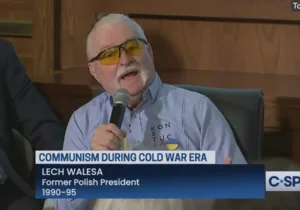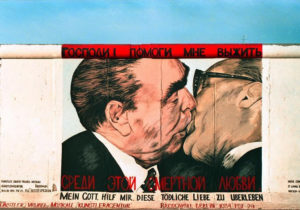Last week I attended the Polish Embassy’s celebration of modern Poland’s 100th anniversary. Appropriately the event was at the U.S. Institute for Peace, with its majestic view of the Lincoln Memorial. Surely Lincoln, savior of his own nation, would approve Poland’s miraculous resurrection and survival.
Among the speakers was Polish stateswoman Anna Maria Anders, daughter of the great Polish WWII commander General Wladyslaw Anders. My favorite part of the evening was meeting one of General Anders’ men, a robust 94 year old WWII veteran who’s lived in America for 60 years. He escaped detention by Russians, Germans and Romanians to reach Anders’ army fighting Germans in Italy. There he reunited with his older brother who had escaped Soviet detention in Siberia.
I asked this Polish veteran if ever during the darkest moments of WWII and his country’s brutal subjugation he ever doubted the Nazis would be defeated. No, he replied. Bolstered by BBC broadcasts, he was always confident the West would prevail. He always had hope, he said. He was accompanied at the gala by his son, who’s written his father’s biography.
Poland, like this veteran, as a nation, sustained by Catholic faith, always had hope, through WWII, through 40 years of Soviet domination, and through 100 years of earlier subdivision between Russia and Prussia. Nations have their own corporate souls that survive through faith or perish through despair. Poland’s faith was a gift to the whole world for the role it played in resistance to and eventually overthrow of the Soviet Union.
Although often disappointed and betrayed, Poland has never entirely stood alone. The veteran, sustained by BBC broadcasts, said he had confidence in the West defeating the Nazis. Western principles of democracy and rule of law, ultimately rooted in biblical justice and anthropology, were and are central to humanity’s hope for a better and more just world where all humans are recognized as image bearers of God. The West’s message always must be transmitted to the world, as it was via BBC, to counter the propaganda of despots and to offer hope.
Captive peoples should always know there is hope. Poland’s hope was renewed in 1917 when President Woodrow Wilson as part of his 14 Points called for Poland’s restoration. This resurrection occurred in 1918 when Germany was defeated by the Western allies. In college I studied under Jan Karski, a hero of WWII resistance who recalled his mother viewed Wilson as savior of Poland, ranked only below Jesus.
Last week Poland’s president recalled Wilson’s 1917 declaration on behalf of Poland was “seen by all Polish people, back then and now, as a landmark event on the way to regaining our sovereignty after 123 years of enslavement.” He added:
The political concept presented by the American leader one hundred years ago relied on two values, equally close to our two respective Nations; that of equality among states: big and small alike, and of their indisputable right to self-determination.
In 1918 America was the first nation to recognize revived Poland, similar to how America was first to recognize revived national Israel 30 years later. Wilson the Presbyterian providentialist was instrumental in both, as a Zionist having placed America in favor of an ultimate Jewish homeland. He represented an intrinsic American partiality towards survival and restoration of subjugated nations.
Poland’s survival and restoration is an inspiration to all who desire a world where nations large and small live together equitably. But pursuit of such a world requires confidence in Western principles rooted in biblical justice, harmony and realism, backed by sustained military force and the will to use it wisely.






